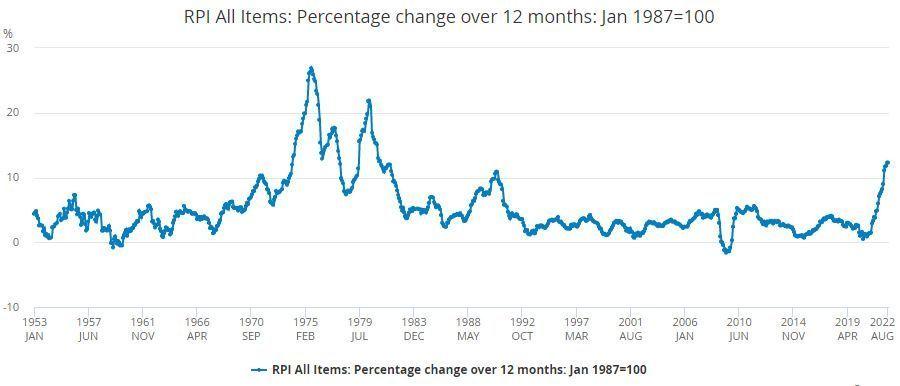Cost of living crisis: An opportunity for a re-set?



How does this relate to the present cost of living crisis? Well, the best time to get on top of personal finance was probably 10 or 20 years ago, but the second best time is now, today. The challenges we are facing, with rising prices and the prospect of increasing rates of interest, offer an ideal opportunity to reset your relationship with money. For individuals you might re-design your financial priorities, build your money knowledge, set financial goals, and take action to meet these objectives. For those working in human resources you might consider financial wellbeing initiatives in the workplace. This blog discusses the current crisis and explores how you might respond.A wise person was once asked “When is the best time to plant a tree?” and they replied, “20 years ago, but the second best time is today”.
Professor George Callaghan
George Callaghan is Professor of Economics and Personal Finance at the Open University, and Director of Positive Money Habits. He is also a certified Executive Coach, with multiple accreditations from leading coaching bodies. His vision is to empower employees and individuals to build positive money habits. He does this by helping groups and individuals understand practical, psychological, and emotional issues around money. By combining education with an understanding of money emotions, people can transform themselves and contribute more to their employer, family, and wider society.The chart below helps explain why the current rate of increase in prices is so shocking – we have not encountered such rates for 30 years (ONS, 2022). The UK last had double digit inflation in 1980 – over 40 years ago.
 Chart showing the UK Retail Price Index (RPI) for period 1953 to 2022. Source: Office for National Statistics.
Inflation matters because it erodes the purchasing power of money. If your income stays the same and prices increase, then you can buy fewer goods and services. What is especially tough is that while we are experiencing a general rise in prices there is a particularly sharp increase in the cost of electricity and gas. While we should celebrate improved living standards which have seen the proportion of centrally heated homes increase from 59% in 1980 to 95% in 2018 (Statista, 2019), this means pretty much every household is facing large increases in energy bills. Poorer households on pre-paid meters are facing particularly high rates.
In my work as a money and career coach I adopt an approach based in appreciative inquiry – and this is a very useful starting point in formulating your response to present challenges.
It starts by inviting you to recognise your strengths, assets, goals, and aspirations. It does not deny or ignore very real problems and challenges you might face, rather it offers a process of inquiry which helps uncover financial wellness solutions. With money issues, typical questions you might ask yourself are:
Chart showing the UK Retail Price Index (RPI) for period 1953 to 2022. Source: Office for National Statistics.
Inflation matters because it erodes the purchasing power of money. If your income stays the same and prices increase, then you can buy fewer goods and services. What is especially tough is that while we are experiencing a general rise in prices there is a particularly sharp increase in the cost of electricity and gas. While we should celebrate improved living standards which have seen the proportion of centrally heated homes increase from 59% in 1980 to 95% in 2018 (Statista, 2019), this means pretty much every household is facing large increases in energy bills. Poorer households on pre-paid meters are facing particularly high rates.
In my work as a money and career coach I adopt an approach based in appreciative inquiry – and this is a very useful starting point in formulating your response to present challenges.
It starts by inviting you to recognise your strengths, assets, goals, and aspirations. It does not deny or ignore very real problems and challenges you might face, rather it offers a process of inquiry which helps uncover financial wellness solutions. With money issues, typical questions you might ask yourself are:
- What is working now?
- What is of greatest value to you?
- What are your hopes and dreams around money?
- What skills and talents do you have?
- What brings you joy around money?
I would like to leave you with a reflection and an invitation.
The reflection draws on our shared economic history. Back in August 1975 UK inflation reached 26.9% and was 21.9% in May 1980. Despite challenges and hardships not only did we come through these tough times, but we also went on to become a much wealthier society. For example, the average inflation adjusted household income increased from £18,049 in 1980 to £37,622 in 2021 (ONS, 2021). The invitation is to try out appreciative inquiry. The negative daily news cycle creates a climate of fear, uncertainty, and passivity. But while there is no denying price increases (particularly energy) are substantial, there is much we can do individually and collectively. Start by recognising your strengths, assets, goals, and aspirations. Identify your locus of control and begin to act. You might include other household members. And then think about other communities you are part of – might you help organise financial wellbeing initiatives in the workplace?Cost of living crisis: How can you help yourself or your employees?
Shocks such as the present cost of living crisis will increase economic hardship for many households. But might they also stimulate meaningful discussions around money? Taking steps to improve your financial wellness may mean you emerge from the present challenge with greater financial strength and resistance.
There is much we can do on our own, but even more we can do by working with a money coach.
Professor George Callaghan offers one-to-one and small group sessions in financial coaching. If you would like to book for yourself, or if you are employed within a human resources capacity and would like to arrange coaching for colleagues, please contact Thrive4Life or email us at [email protected]

